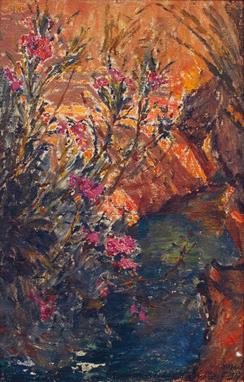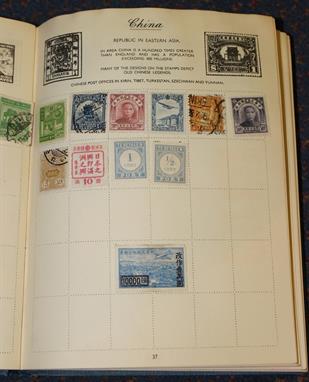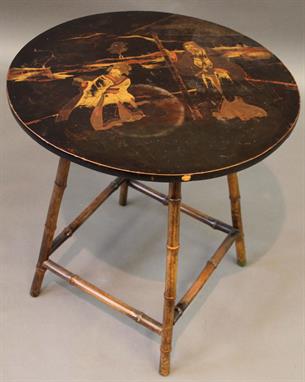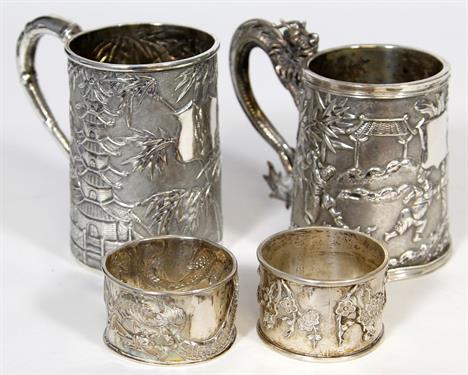We found 596772 price guide item(s) matching your search
There are 596772 lots that match your search criteria. Subscribe now to get instant access to the full price guide service.
Click here to subscribe- List
- Grid
-
596772 item(s)/page
OOR WULLIE [WATKINS (DUDLEY DEXTER)] Oor Wullie [Number 1, 1940], illustrations throughout, publisher`s pictorial wrappers, A VERY SCARCE COPY, 4to, D.C. Thomson, [1939] London, Manchester & Dundee: D.C. Thomson & Co., [1940]. First annual produced, 4to, 96 pages, original printed wrappers showing Wullie sat on his trademark bucket, lower hinge torn at head, upper section of backstrip becoming loose, some creasing and short tear to outer edges, a few spots to page edges Notes: A very rare copy of the first Oor Wullie annual produced by Dundee publishers D.C. Thomson & Co in October 1940 [priced 1/6]. The annual has 96 pages, which became the standard number, consisting of a title page illustration, a poem/song and 94 cartoon strips reprinted from Sunday Post Fun Sections. The creator of `Oor Wullie`, Dudley Dexter Watkins was born in Manchester on 27 February 1907. In 1925, he moved to Dundee to work for D.C. Thomson & Co Ltd. the company founded by wealthy Tayside shipping boss William Thomson in 1905. In 1935 R.D. (Robert Duncan) Low, the Managing Editor and Head of Boys Story Papers at the time, asked Watkins to help him produced a new comic book for D.C. Thomson. Low was keen to keep a degree of realism to the new characters and he encouraged Watkins to use real people as the basis for his cartoon characters. Many of the characters were based on Low`s own family , Oor Wullie being modelled on his son Ron.
THE BROONS [WATKINS (DUDLEY DEXTER)] The Broons [Number 2, 1942], illustrations throughout, publisher`s pictorial wrappers,a very rare copy, 4to, D.C. Thomson, [1939] The second ``The Broons`` Annual. The works of artist Dudley D. Watkins were first noticed when his cartoons The Broons and Oor Wullie were published in March 1936 in The Sunday Post weekly newspaper. The popularity of his cartoons grew to such an extent that in 1939 the first Christmas Annual was printed. The Broons and Orr Wullie Annuals were then published in alternate years, starting with The Broons in 1939. Watkins was also known for his early contributions to the comics The Beano and The Dandy. The early editions of these paperbound comic annuals are particularly rare.
CHARLES HENRI JOSEPH CORDIER (1827-1905) JUIVE D’ALGER JEWISH WOMAN FROM ALGIERS Épreuve en bronze argenté, doré et émaillé, inscrite sur le foulard et datée 1869. Fixée sur une base en marbre. HAUT. 49 cm (H. 19 5/16 IN.) Provenance : Collection particulière, France. Cordier est l’enfant turbulent d’une famille de Cambrai. Après des études difficiles, il part étudier dans l’atelier du sculpteur Louis Bougron à Lille. Il part pour Paris en 1844, et entre en 1846 dans l’atelier de François Rude. C’est là qu’il rencontre Seïd Enkess, esclave noir affranchi qui deviendra son modèle, et dont il expose le buste au Salon. C’est le début de son œuvre ethnographique. En 1854, il fait un premier voyage en Algérie dont il rapportera "une belle collection de bustes". Il devient un sculpteur reconnu, reçoit des commandes officielles, et expose à Paris, en province et à l’étranger. Il est le grand-père de Suzanne Drouet-Réveillaud. Notre sculpture "La juive d’Alger" est l’une des versions de ce célèbre modèle. Cordier illustre son art de sculpture polychrome, alliant or, argent et émail, et contrastant ainsi avec les sculptures monochromes du Salon. Cordier was the boisterous child of a family of Cambrai. After mediocre studies, he studied in the studio of sculptor Louis Bougron in Lille. He went to Paris in 1844, and joined the studio of François Rude in 1846. This is where he met a black freed slave, Seid Enkess, who became his model. He exhibited Seid Enkess’s bust at the Salon. This is how he started his ethnographic work. In 1854, he made his first trip to Algeria and brought back "a fine collection of busts". He became a famous sculptor, received official orders, and exhibited in Paris, in the provinces, and abroad. He was the grandfather of Suzanne Drouet-Réveillaud. Our sculpture, "The Jewish woman from Algiers”, is a version of this well-known cast. Charles Cordier shows his art through this polychrome sculpture, combining gold, silver and enamel, which contrasts with the monochrome sculptures of the Salon. Bibliographie : - CHARLES CORDIER, "l’Autre et l’ailleurs", Éditions de la Martinière, Paris 2004. - Œuvres similaires reproduites dans cet ouvrage, répertoriées au catalogue raisonné par Jeannine Durand-Révillon et Laure de Margerie, pages 183 à 185, sous les numéros 331 à 340.
ALPHONSE ÉTIENNE DINET (1861-1929) LE DEPART POUR LA FÊTE ON THE WAY TO THE PARTY Huile sur toile, signée en bas à droite. 50,5 x 74 cm (19 7/8 x 29 1/8 In.) Étienne Dinet fit son premier voyage en Algérie en 1884 avec son ami Lucien Simon. Il y retourna l’année suivante, et en 1887 devint membre de la Société des Peintres Orientalistes fondée par Léonce Bénédite. Il fut l’ami du peintre Paul Leroy, et s’inscrivit à l’école des langues orientales pour apprendre l’arabe. Sa rencontre avec Slimane Bin Ibrahim, qui devint son guide, son conseiller et enfin son ami fidèle, fut déterminante. L’Algérie devint alors son unique source d’inspiration et lui apporta l’énergie et la vivacité qu’il lui fallut pour peindre ses magnifiques tableaux. Dinet fit de nombreux et longs séjours en Algérie, se convertit à l’Islam, et fit le pèlerinage à La Mecque. Sa connaissance et son amour de l’Algérie lui ont permis de reproduire dans ses tableaux les qualités de ce pays et de ce peuple devenus siens. Dinet peignit des scènes de désert, des sujets religieux, de magnifiques ouled-nails, et des scènes enfantines. Jeunes garçons jouant avec un sou, jeunes filles au bain sont autant d’illustrations de la joie de vivre dans le sud algérien. Le tableau que nous présentons représente un groupe de jeunes filles tenant une petite fille. C’est le soir, la lune est haute mais la nuit n’est pas encore tombée. Elles sont richement vêtues, et portent de magnifiques bijoux. Elles sont pressées, et semblent courir vers une fête, un mariage, une musique ? Dinet a merveilleusement rendu le mouvement par le jeu des tissus qui se froissent sur les corps qui semblent vouloir sauter hors du tableau. La jeune fille à gauche semble y être parvenue, grâce à l’audace du peintre qui ne nous montre qu’un morceau de son corps. La petite fille quant à elle semble portée par ses amies ou ses sœurs pour qu’elle marche plus vite. Le peintre s’est plu à dépeindre la richesse des couleurs des vêtements et des foulards rouge, jaune ou vert. La nuit mauve arrive, mais le soleil invisible dans l’œuvre éclaire la montagne d’une chaude teinte orangée. C’est un tableau joyeux et plein de vie que l’on se plaît à admirer. Etienne Dinet made his first trip to Algeria in 1884 with his friend Lucien Simon. He travelled back to this country the following year, and, in 1887 became a member of the Orientalist Painter Society founded by Leonce Bénédite. He was a friend of the painter Paul Leroy, and enrolled at the School of Oriental languages to learn Arabic. His meeting with Slimane Bin Ibrahim, was decisive. Slimane became his guide, his advisor and a faithful friend. Algeria became his unique source of inspiration and gave him energy and vivacity to paint his paintings. Dinet spent many years in Algeria, converted to Islam, and made the pilgrimage to Mecca. His knowledge and love of Algeria gave him the ability to put into his paintings the warmth of this country and of this people that had become his. Dinet painted desert scenes, religious subjects, beautiful ouled-nails, and children scenes. Boys playing with a penny, girls in the wadi are all illustrations of the joy of living in southern Algeria. The work we present depicts a group of girls holding a little girl. The scene takes place in the evening, the moon is high but the night is still young. They are richly dressed and wear beautiful jewels. They are in a hurry, and seem to run to a party, a wedding, or the sound of some music ? Dinet wonderfully showed the movement throughout the clothes that wrinkle on the bodies. The girls seem to want and jump off the painting. The girl on the left seems already out, thanks to the daring of the artist who painted only a small part of her body. As for the little girl, she seems to be carried away by her friends or sisters to walk faster. The painter enjoyed painting the rich colors of clothes and the colorful bright scarves. The purple night is falling, but the invisible sun in the work illuminates the mountain into a warm orange color. It is a happy and joyful image of life that Dinet is showing us.
ALEXANDRE ROUBTZOFF (1884-1949) FLEURS à COLOMB-BECHAR FLOWERS IN COLOMB-BECHAR Huile sur toile marouflée sur carton, signée, située et datée "30 mai 1917" en bas à droite. À VUE : 26,5 x 17 cm (10 7/16 x 6 11/16 IN.) Provenance : Collection particulière, France. Après un voyage dans le sud de l’Espagne, où il découvre l’architecture mauresque, Alexandre Roubtzoff décide de visiter la Tunisie. Il a 30 ans lorsqu’il arrive à Tunis en 1914. Il va alors entamer une véritable vie de "peintre-voyageur", explorant l’Afrique du nord. Cependant, son pays de prédilection reste la Tunisie. Notre tableau, œuvre magistrale restée inconnue depuis 1920, est une magnifique illustration de la belle série de tableaux sur les femmes tunisiennes de ce grand artiste orientaliste. Deux jeunes femmes au premier plan discutent, assises sur des nattes. Leurs vêtements, leurs bijoux, leur attitude tranquille illustrent la douceur de vivre de ce pays baigné de soleil. Chacune des femmes est identifiée par son prénom. Se côtoient donc "Fatma", "Salma" et "Mahbouba", modèles chers à Roubtzoff qu’il représentera parfois seules dans ses autres tableaux. Alexandre Roubtzoff se montre un merveilleux coloriste dans ce tableau où les bleus jouent avec les roses et les jaunes. Mais c’est aussi un fidèle témoignage de la vie quotidienne en Tunisie, et de ses costumes traditionnels. After travelling to southern Spain where he discovered the Moorish architecture, Alexander Roubtzoff visited Tunisia. He was 30 years old when he arrived in Tunis in 1914. He began a new life as a "painter-traveler", exploring North Africa. However, Tunisia remained his favorite country. Our painting, privately owned since 1920 and fresh on the market, is a beautiful illustration of Alexandre Roubzoff’s skill as an Orientalist painter as well as a genre scene painter particularly talented for representing beautiful ladies. Two young women on the foreground are discussing, sitting on mats. Their clothes, their jewelry, their leisurely attitude illustrate the peaceful life in this country bathed by the sunlight. Each woman is identified by her first name. "Fatma", "Salma" and "Mahbouba", some of Roubtzoff’s favorite models have often been painted as a single figure. Our painting is quite rare for, Roubtzoff chose to represent them as a part of the Tunisian life and not as plain models, giving them a real life. Alexander Roubtzoff is a wonderful colorist where the blue color plays with pink and yellow. But this masterpiece is also a true testimony of everyday life in Tunisia, and traditional oriental costumes.
A large collection in albums and folders, including Great Britain and world collection of stamps, Great Britain first day covers, Australian first day covers, 1946 Victory Set, mint, 1953 Coronation and an interesting range of covers stuck into folders, including mainly Second World War with censor markings from Canada, Ireland, India, South Africa, USA, etc. (some affected by damp).
PHOTOGRAPHS, SPORT. A collection of approximately 50 photographs of sports teams, the majority framed, including photographs titled `Cheshunt Hockey Club 1930-1931`, `Rugby Hockey Club Season 1905-1906` and `The Early Risers Team Winners of Saunders Challenge Cup, first year presented, Season 1888`.
A Sanderson Patent hand camera, folding plate action, finely polished mahogany wood interior with lacquered brass slide, runners, etc., probably de-luxe model, sold with spare plate holders, also included in lot a cased Kodak Brownie and an Ensign Simples Auto plate camera. Also includes photographic interest books, i.e. Brandt `Camera in London`, `Camera` magazine Jan 64, featuring the First War photographs and `A Facet of Modernism` by Van Deren Coke with Diana Dupont.
A hallmarked silver 1929 Harwood self-winding wristwatch, the cream dial with Arabic movement and outer minute track, the circular silver case with import marks for Glasgow 1929, the automatic movement signed Harwood self-winding watch Company Ltd and with patent no. 106583, to brown leather strap, case width approx. 28mm (af) watch currently not in working order. NB: this watch represents an important development in the history of watches, John Harwood developed the first automatic wristwatch, this being an early example, he identified the common winder as the source of much dust and dirt which caused problems with many watches of the time, as an experienced watch maker he developed the self-winding oscillating movement to combat this problem, on September 1st 1924 one year after he registered his invention at the Federal Office for Intellectual Property of the Swiss Confederation at Burn, Harwood was issued the patent no. 106583 for his pioneering invention. A toothed oscillating pendulum in the centre of the movements backside used the wearist kinetic energy to wind the main spring and thus the idea of the automatic movement was born (illustrated)
Georges & Jean Jacques Le Saché: An exquisite black enamel gem set brooch, in the form of a Blackamoor, wearing a diamond set tunic with ruby, pearl and amethyst off, the gold turban having a central emerald cut diamond with turquoise and pearl surmount and articulated pearl earrings, approx 48mm Georges Le Saché (b.1849) was an important jewellery designer and manufacturer born into a family of artists and engravers, he joined unknown Parisian firm Talize in 1872. In 1877 he married the daughter of Baucheron, partner of Baucheron & Guillian. Le Saché worked for and eventually took over the firm. He became one of the most sought after manufacturers in Paris, supplying the best maisons including Tiffany, Cartier and Baucheron. In 1901 he was awarded the silver gilt plaque by the Cambre Syndicate de la Bijouterie, the highest accolade in recognition of his work. Around 1920 he handed over to his son, jean Jacques, who continued working in Paris under his guidance. This brooch was made designed by Georges and Jean between 1937 to 1939. It was intended for the market but was taken to Geneva and protected during WWII from there it was kept in the family and given to the vendors mother, the actress Pamela Stirling on the event of her marriage to Jean's son Claude in the 1950's. The brooch is therefore offered to the market for the first time, together with a collection of family ephemera, including a range of hand drawn jewellery designs of the period (illustrated) CONDITION REPORT: very good condition
A Japanese black lacquered occasional table, first half 20th century, the circular top, with all over black lacquered ground and applied with gilt and enamel depictions of scholar and bijin within a veranda interior, a mountainous landscape flanked with trees in the distance, raised on four bamboo supports united by integral stretchers, 63cm high, 58cm diameter
A Quartetto nest of Chinese hardwood occasional tables, first half 20th century, the sunken rectangular plank top each set within simulated carved bamboo frames, the supports and stretchers similarly carved, further applied with pierced budding lotus flower fret work, smallest 56cm high, 39cm wide, 34cm deep, tallest 65cm high, 58.5cm wide, 27.5cm deep
A pair of Chinese Kangxi 'style' blue and white garden seats, 19th/20th century, each of barrel form with swollen bodies, the body applied with prunts, the upper edges adorned with ruyi designs and painted throughout in rich cobalt depicting twisting tendrils with blossoming lotus blooms, the upper flat seat with pierced medallion, 49cm high (illustrated) CONDITION REPORT: First has a large shallow chip to one of the vertical edges, approx 4 x 5cm in size Scratching to top Second - small chips to the vertical edge Both appear to be free from any further significant damage or restoration
Two Chinese export silver tankards, Wang Hing & Co, circa 1800-1900, each of the tapered cylindrical tankards, chased with depictions of figures fighting within bamboo gardens, and four tiered Pagodas, cast with bamboo and dragon handles, 8cm and 9cm high, together with two Chinese napkin rings, one stamped Wang Hing & Co (illustrated) CONDITION REPORT: Tankards - the first tankard with fighting scenes, has a small dent to the base, second tankard in good condition Napkin Rings - Both napkin rings have small minor dents
A large collection of wartime memorabilia to include aerial photographs of first world war trenches, a diary dated 1916 listing casualties and troop movements, type written notice regarding a narrative of tour in the trenches of third cavalry division dated 1915, photographs of Royal Flying Corps airmen, two Royal Flying Corp cloth badges, further photographs of soldiers, nurses etc, also WWII memorabilia regarding Corporal R F Curtis of the RAF who died 14/09/1947, further letters, air raid precaution leaflets, booklets etc (illustrated) CONDITION REPORT: Nothing relating to Cyprus
A collection of modern white metal and gilt metal proof medallions to include canonizatiton of Pope John Paul II, Sir Deidre of the First World War, copy of the United States of America twenty dollars, copy of a one pound, copy of the Coronation medal of Queen Victoria, plus further coinage etc
A.W. Moore - 'A History of the Isle of Man', in two volumes, published by T. Fisher Unwin, London 1900, bound in blue cloth with gilt lettering, two copies of the Manx Pathological Survey, first - fifth reports and sixth report and two paperback versions dated 1968, also in this lot a copy of the Posthumous Papers of the Pickwick Club by Charles Dickens, illustrated by Cecil Aldin, published by Chapman & Hall Ltd London 1910, further books to include Czechoslovakia, Young Folks Bookshelf, copies of the House and Garden, Human Zoo and Parents are a Problem by Maisie Grieg (60)
Two Chinese carved ivory brush pots, late Qing Dynasty (1644-1912), the first of cylindrical form with central holder, carved to the exterior with a series of Manchu people, 7.5cm high, 6cm diameter, the second a brush pot or napkin ring, carved to the exterior sides with blossoming lotus, 5.5cm high (2) CONDITION REPORT: First carved with manchu people - cracking to the top, small cracks to the base and exterior sides, remnants of pigment visible throughout Second - possibly a napkin ring, several small natural age cracks, small chips to upper edges, otherwise sound
A pair of Locke & Co Worcester vases, circa1890/1900, each of the bottle form vases with depiction of loch Achray and loch Lomond above a relief acanthus and stiff lappet knopped stem, rising to a reticulated flared neck with blush ivory ground, heightened with gilt throughout, 18 cm high (af) CONDITION REPORT: First vase has a large section missing from the upper rim, approx. 3cm x 2cm in size. Second vase has been restored at the knopped stem, and previously stuck back together. Gilt and enamel remain in good condition.
Two Chinese cast bronze and inlaid cloisonne censers, early 20th century, the first of lobed quatrefoil form, raised on four scrolling supports with Taotie mask terminals flanked by twin mythical beast handles, 21cm high, 33cm wide, the second of bombe form raised on tripod splayed supports, 20cm high each with inlaid enamel and wirework floral designs, set with trellis work moulded ground
PAM AYRES- Pam's visits to her donkeys are always a joy and she always spends hours writing poems about them and their work. Her donkeys Emily and Elliott are pink and originated in Sark, but where abandoned in Cumbria. Elliott was our first born at the trust and Pam and her husband have always been very proud of that. This lot includes sculptured models of Emily and Elliott, as well as two donkey sanctuary tea towels with Pam Ayres poems printed on them, a Sheila Gill hand signed artist proof print entitled 'two little boys' depicting a child feeding a donkey, a framed montage of donkey photographs and a laminated large scale photograph of the two donkeys in question. (illustrated)
-
596772 item(s)/page








![OOR WULLIE [WATKINS (DUDLEY DEXTER)] Oor Wullie [Number 1, 1940], illustrations throughout, publisher`s pictorial wrappers,](http://lot-images.atgmedia.com/SR/294/2915289/348-2014102413235_468x382.jpg)
![THE BROONS [WATKINS (DUDLEY DEXTER)] The Broons [Number 2, 1942], illustrations throughout, publisher`s pictorial wrappers,a](http://lot-images.atgmedia.com/SR/294/2915289/349-2014102413237_468x382.jpg)

















































